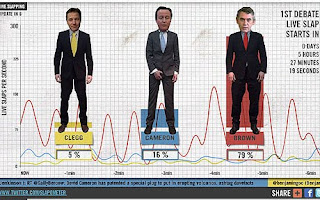
So we’re three weeks away from the big day now, the event we’ve been excitedly anticipating for longer than I care to remember. No it’s not the start of the World Cup, nor is it the Britains Got Talent Final; it’s the 2010 General Election. OK, so maybe it’s not keeping you awake at night with uncontrollable enthusiasm, but following the deepest and most damaging recession for more than a generation the outcome of the election on 6th May will have a long lasting impact.
I was excited to hear politicians suggest this would be the first ‘digital election’, an opportunity to engage a generation supposedly more interested in the latest TV talent show than policies on economic recovery or Afghanistan.
Whilst we still have some way to go, it does seem we really are witnessing a shift in the way political issues are discussed and shared. The first of three TV leaders’ debates last week saw an estimated 2,500 tweets every minute; discussing everything from the colour of the leader’s ties to serious policy analysis. Ingenious web techies across the country have developed a range of online tools to encourage people to take notice. From the rather satisfying ‘Slapometer’ to using twitter to create real time opinion polls, the internet is proving that whilst the major parties still seem to be missing the point when it comes to digital engagement there are plenty of people showing just how powerful it can be.
For years I’ve been angered by reference to the so called ASBO generation. “Young people don’t care!” “Teenage society is broken!” We’ve heard it all. The reason this type of rhetoric has gone unchallenged is the unwillingness of the political classes to engage with, and attempt to listen to, the millions of brilliant young people working hard to make their small part of our world a little better. Maybe the internet has finally given everyone a voice.
I’ve been staggered by the passion many of my peers have shown in this election, but I don’t believe this is entirely down to the fad of social networking. Young people care about what the government does. Students graduating this year are doing so into the most competitive job market imaginable, and they may well be footing the bill of the budget deficient for the better part of their working lives. Millennials care about issues of equality and freedom of speech; and the response to the steamrollering of the Digital Economy Bill onto the statue books illustrates brilliantly how young people understand and care about the decisions that shape our society.
The internet has not caused this passion, but is has given a voice to young people where they may have otherwise been ignored. Whoever walks up to number 10 on 7th May will do well to remember that a politically engaged young generation demand and expect so much more. Deals made in darkened Westminster offices about issues that really affect young people will not be tolerated if this trend continues.